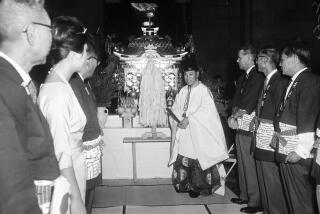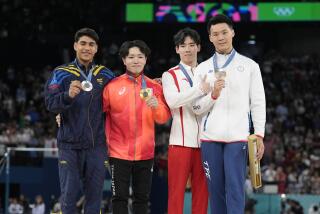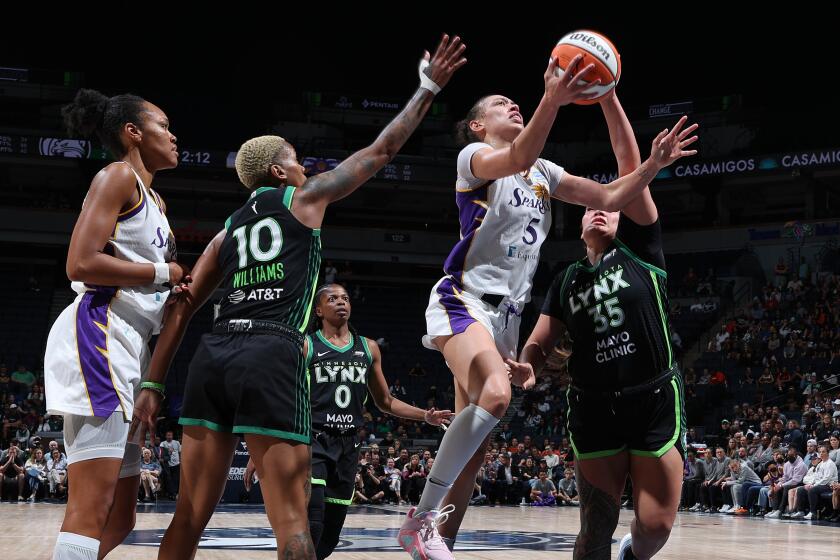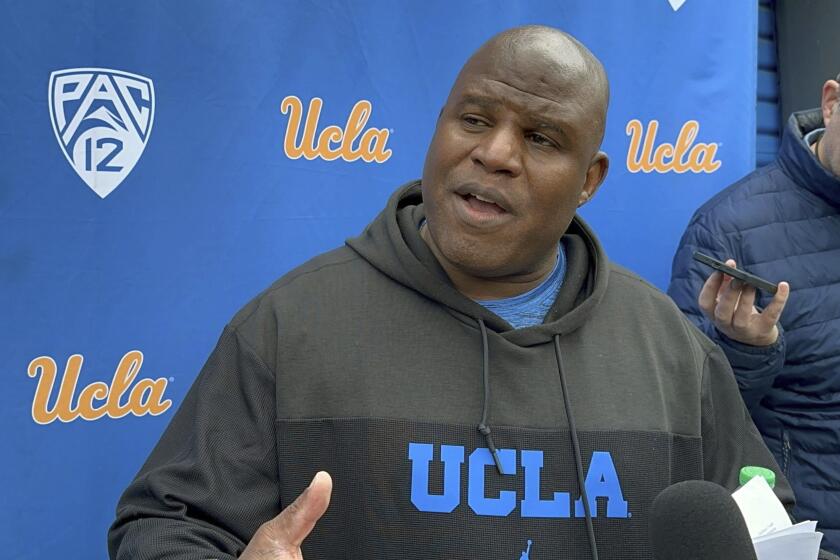Fake Olympic merchandise is secretly for sale in China
IF ANY place would be selling cheap, pirated copies of Olympic souvenirs, it’d be the Yatai Xinyang Fashion and Gift Market, a notorious underground maze of stores in Shanghai’s suburban Pudong district. Fakes of Prada, Callaway, Apple and countless other famous brands abound -- mostly in plain sight.
But Olympic items are another matter. They’re all hidden away.
At one toy shop, the mention of the Beijing Olympics prompted the merchant to reach for a black suitcase. It was filled with racks of bootleg watches. He flipped through them and pulled out a pair of his-and-hers Omegas with the colorful five-ring Olympic logo inscribed across the face, above the words “Swiss Made.”
“I’ll give it to you for $45,” he said of the men’s timepiece, rubbing the black band to show that it was real leather. “Don’t go. We can deal. I’ll give you a cheaper price for two.”
The Xinyang market (pronounced shin yahng) is keeping Olympics stuff out of sight for good reason. China’s bootleg police have been cracking down hard on traders of pirated souvenirs, here and in Beijing and other cities, showing that when China wants to do so, it can make a serious effort in the battle against piracy.
In the last few years, Beijing has seized hundreds of thousands of fake Olympic items and toys, according to government and state media reports. Dozens of people have been prosecuted and fined well over $1 million. The Chinese government set up a hotline -- and is offering rewards of up to $14,700 -- for people to report counterfeiting of Olympic merchandise.
“I can feel that the crackdown effort this time is stronger and the scale larger,” said Tao Xinliang, dean of Shanghai University’s Intellectual Property School.
The government’s aggressiveness is more than just a desire to clean up its image before the world. There’s a lot of money at stake in the selling of licensed Olympic goods. As the host of the Games, Beijing stands to receive as much as 10% of the sales, expected to easily surpass the $61.5 million that the Athens Olympics in 2004 generated.
That’s incentive for authorities to keep making the rounds at Xinyang -- and merchants to keep playing the cat-and-mouse game. Xinyang runs along tunnels that connect to a subway station, and vendors have back rooms or secret attics for hiding goods.
In one of several shops selling “ Tiffany & Co.” jewelry, the wall was covered with necklaces, all said to be 92.5% pure silver. There were three pieces, though, that were displayed backward. When asked about Olympic items, the merchant flipped over the three pendants. Each showed an etching of a Beijing Olympic mascot, called a fuwa, a doll of blessing.
The merchant took out an oversized calculator and tapped his opening offer: $38 each. He soon lowered it to $30, 10 for $27 each.
“It’s exactly like the real thing,” he said, confiding that the pendant was smuggled from a factory near Hong Kong that produces silver necklaces. “We don’t pay duties, so it’s cheap. That’s how it works in China. We have connections.”
(Salespeople at an authentic Tiffany shop in Shanghai said they don’t carry any Olympic necklaces.)
Nearby, a woman who gave her name as Lily was selling T-shirts with Billabong and Quiksilver labels. At first she said she didn’t have Olympic attire. But then she said, “Wait” -- and reached for her cellphone.
A few minutes later, a woman arrived toting a black garbage bag. Lily rifled through it and held up a white Adidas knit shirt. It had “Beijing 2008” and the Olympic rings embroidered under the left collar.
Looking up, she asked, “What size do you want?”
More to Read
Go beyond the scoreboard
Get the latest on L.A.'s teams in the daily Sports Report newsletter.
You may occasionally receive promotional content from the Los Angeles Times.











